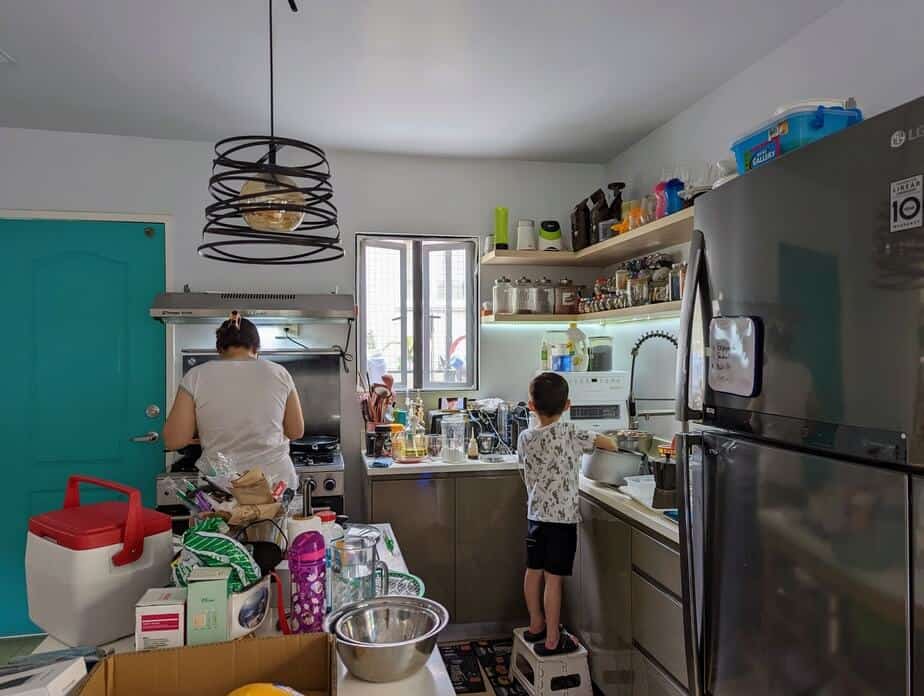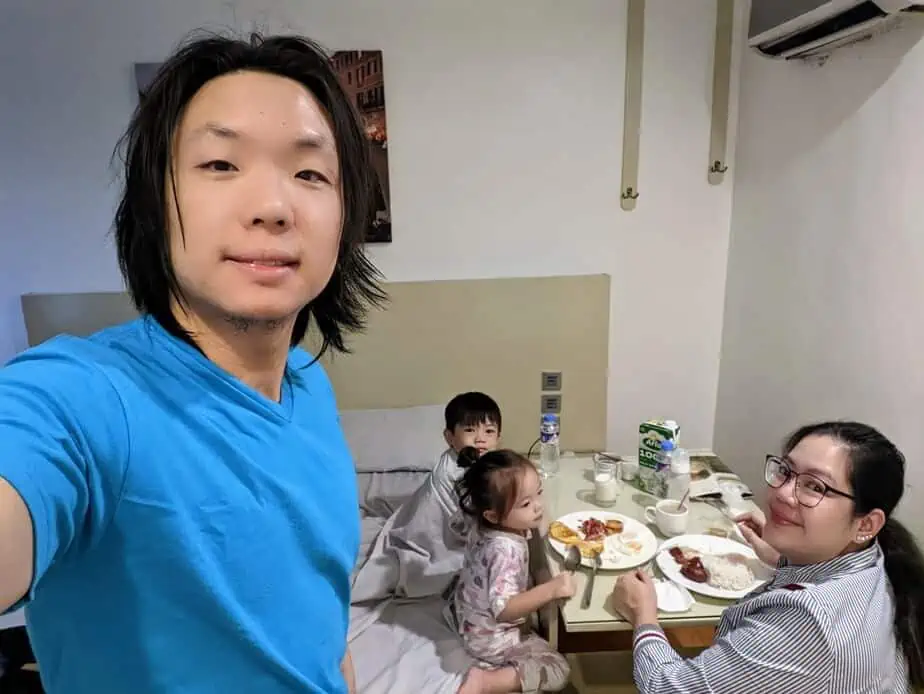Leaving your parents after marriage isn’t only about moving out to a different house. It’s much deeper than that. Too bad for me, I learned this lesson a little too late. The tension in our family has already reached its peak where my wife and I got into a fiery argument with my dad and brother.
You leave your parents after marriage by emotionally separating yourself from them. This means setting up clear boundaries that will allow you to give priority to your spouse, support yourself, set up your own rules, and care for your parents without obligation.
Thank God we’re all doing great now. The transformation began when we started to draw clear lines in our relationships. I know this may sound selfish, rude, or even rebellious. But what these lines truly represents is respect. Respect for each other’s interests, resources, and freedom. This article aims to give you ideas on how to set up healthy boundaries with your parents after marriage. It is inspired by the book, Boundaries, by Dr. Henry Cloud and John Townsend.
I highly recommend you get a copy of the book if you want to dive deeper into this topic. You can purchase it by following the links in the recommended reading section below. I’ll earn coffee money from the referral with no extra cost to you.
Disclaimer: this post is based on the author’s own experiences and opinions.

1. Move Out Of Your Parents’ House
Moving out is the easiest and most basic way to set boundaries with your parents. Distance will naturally act as a fence that separates our new family from the old. I lived with my parents for three years before we changed address. The truth is we didn’t have plans to move out. I’m the eldest in the family, so my wife and I have already accepted our fate of taking care of my parents in their old age.
But our plans changed when tension in the family started to brew. I’m not one hundred percent sure when it began, but my suspicion is at the time when our first child was born. It seems like everyone got too excited about their new roles in the family, which eventually resulted in overstepping our personal boundaries:
- The brother, now an uncle, who likes to play even when it’s already sleeping time.
- The parents, now grandparents, who offer foods we don’t permit.
- The sister, now an aunt, who kisses on the lips.
- We, the new and tired parents, who overthink and overprotect.
I’m sure nobody has any ill-will toward the first baby in the family. Each person has good intentions. Yet those intentions don’t necessarily align with one another. We talked over this matter many times in hopes everybody can look at the same page. But it seems each one of us is already sold in our own positions.This is why putting distance is way better than arguing over something that both parties could be right in their own respect.
Newly married couples can greatly benefit if they live separately from their parents right after their wedding day. It doesn’t matter whether you have loving or toxic parents. Living with them alone increases the potential of conflicts due to boundary issues. Distance will protect each other’s interests and promote a more harmonious family life.
2. Prioritize Your Spouse.
But not all who moved out of their parents’ house have actually left their parents after marriage. Many couples live away physically, but they’re fully attached emotionally. One of the most vital lessons I learned from our marriage counselor is there is such a thing as an order of priority in relationships. She said besides God, my number one priority now should be my wife, and then my children.
- God
- Spouse
- Children
- Others
Marriage should detach us from the temporary parent-child bond and be united to the permanent husband-wife covenant. Essentially, it means my wife must come before my mother, father, brother, sister, and even my children. The same goes to her. As her husband, no other person should be more important than me. Many marriages struggle because they do it the other way around. They give the leftovers to their spouses.
Lalaine and I enjoy our marriage more today because aside from moving out physically, we have also learned how to detach ourselves from our parents emotionally. It took us awhile, but after we got the hang of it, our married life has never been the same. We were happier and more secure with one another.
Prioritizing our spouse is not easy. Many are deeply attached to their parents even after marriage. Some are even scared of getting married simply because they can’t bear the thought of leaving mom and dad. Unfortunately, based on experience, there is no convenient way of doing this than to decide. Decide that you will detach yourself from your parents and be fully attached to your spouse. Ironically, the literal meaning of decide is to “kill-off”. De = off; Cide = kill or cut. This may mean:
- Saying “no” to your parents, so you can say “yes” to your spouse.
- Leaving the family corporation to start a husband-and-wife business.
- Moderating communications and interactions with your parents.
- Going with your spouse’s gut feeling rather than your parents’ advice.
Of course, not all parents would take this positively. You may need to sit this down with them and explain why you must focus on your spouse more.

3. Support Your Parents Out Of Love, Not Out Of Obligation.
Parents should take care of their children, but children aren’t obliged to do the same for their parents. This is a controversial take, but I didn’t make this up on my own. I learned this in one of my sessions in family counselling, and also from the book Boundaries. I’m not sure how your relationship with the Word of God is, but the foundation of this notion is in 2 Corinthians 12:14. It says, “For children are not obligated to save up for their parents, but parents for their children.“
I don’t know if it’s just me. But have you observed that poor families have more children than those who are affluent? I see wealthy families have two to three kids, while those who don’t know where to get their next meal have a dozen. All these years I thought it was a result of too much time in their hands. They have nothing to do all day, so…what better way to spend it than manufacturing babies, right?
But I later learned from a friend, who works in a charity institution, that these poor families don’t produce offspring because they are bored. No, they don’t do it randomly. Rather, these babies are part of their master plan. He said their goal is to produce children who can one day be successful and get them out of poverty. It’s like playing the raffle: more entries, more chances of winning!
Poor kids. They’re not even born yet, and they are already destined to take care of their parents. It’s a duty they didn’t sign up for. To be fair, this doesn’t only apply in lower class families. The rich and the middle-class also have the same expectations from their children.
As the eldest son, I felt the pressure too. Caring for my parents more than I should have has affected me earlier in my marriage. There are times when I feel guilty when I give more attention to my wife and kids than them. I felt like I was not being a responsible son.
Leaving our parents after marriage also includes embracing the truth that we are not in any way indebted to them. We are their responsibility, not the other way around. This also applies to me now that I am a dad myself. I am obliged to take care of my kids, but I should not expect them to take care of me when I get old. I hope they do, but I won’t pressure them to do so.
Create A “Parents Fund”
While we are not bound to give financial support to our parents, this doesn’t give us the license to ignore them completely. The Bible also says we should honor our father and mother. I’m not sure what this means to you. But to me, it is taking care of them not out of obligation, but of love.
The way I do this currently is to allocate a budget called the “Parents Fund”. Here, I set aside a portion of my income to honor my parents. Whatever amount I saved there will be spent solely for them. I can use it to treat them out to nice restaurants, add it to their health budget, or give it to them in cash. The only caveat is this fund should not hamper my ability to provide for my family – which is my greater responsibility.
4. Set Your Parents Free From Their Obligation Towards You.
Another way to leave our parents after marriage is to stop depending on them. We must set them free from their obligations. Married couples should now be fully dependent on each other. Let mom and dad enjoy their season as empty-nesters.
Do you still let mom and dad buy your groceries? Drive you to your office? Pay your utilities? Or give you allowances? This is a sign that you are still dependent on your parents. This has to stop ASAP because it could hamper your growth and affect your marriage negatively. According to Dr. Henry Cloud, “Adults who do not stand on their own financially are still children.”
How do you stop depending on your parents?
- Practice. Remove the crutches slowly. Try to eliminate one benefit you get from your parents every month. Do it consistently until you become fully dependent on yourself or spouse. Start with the little things like paying for your own internet next month.
- Remove your parents from the equation. Do you always expect your parents to save the day? Cut it out from now on. Always try to resolve matters within your means first. Only consider them in emergency situations.
- Separate your accounts. Cut any banks, credit cards, and other accounts you have linked with your parents. The only account should be linked to you is your spouse’s. This also applies to possessions. Their house is no longer your house. Their car is no longer your car. Even the house helpers and drivers who served you when you’re a kid are no longer under your authority.

5. Establish Your Ground Rules.
You have fully left your parents after marriage when you finally established your own ground rules. Many husbands and wives clash because they still operate under their parents’ authority and family’s culture. Someone close to me says his main struggle in marriage is his wife always quotes her mom:
- “Mom said I cannot eat this.”
- “Mom said we should do it this way.”
- “Mom said we must go here.”
Marriage won’t work if you don’t establish your house rules. Yet what worked in one family may not work in another. Thus, we cannot simply copy our parents’ rules and paste them into our own. Husband and wife should develop a family constitution that applies to them both and commit to it.
Here are twelve rules we live by as a family (thus far):
- There is time for everything. (If it’s time to eat, time to eat; if it’s time to sleep, time to sleep.)
- If it costs you your peace, it’s too expensive.
- Be on time. Especially on payments.
- Live with integrity. Be authentic and transparent.
- Always use what’s available.
- Live within your means.
- Let your yes be yes, your no be no. (Be decisive and committed)
- It’s okay to make mistakes, as long as you take responsibility.
- Take care of your stuff.
- If you don’t know, learn. If it’s hard, practice.
- Don’t make permanent decisions based on temporary emotions.
- If you want to win everything, be prepared to lose everything.
Summary
Leaving your parents after marriage is less about the physical and more about the emotional. Many couples may have left their houses after the wedding day, yet are still fully attached to their parents. Leaving home after marriage means you now put your spouse first, relieve mom and dad of their obligations, and have established your own ground rules.
More From The Learning Dad Blog
- 8 Important Things You Should Know Before You Move Out
- What Does Moving Out Teach You?
- Is It Worth Moving Out Of Your Parents’ House?
- When Should You Move Out Of Your Parents’ House?
- Is It Hard To Move Out Of Your Parents’ House?
